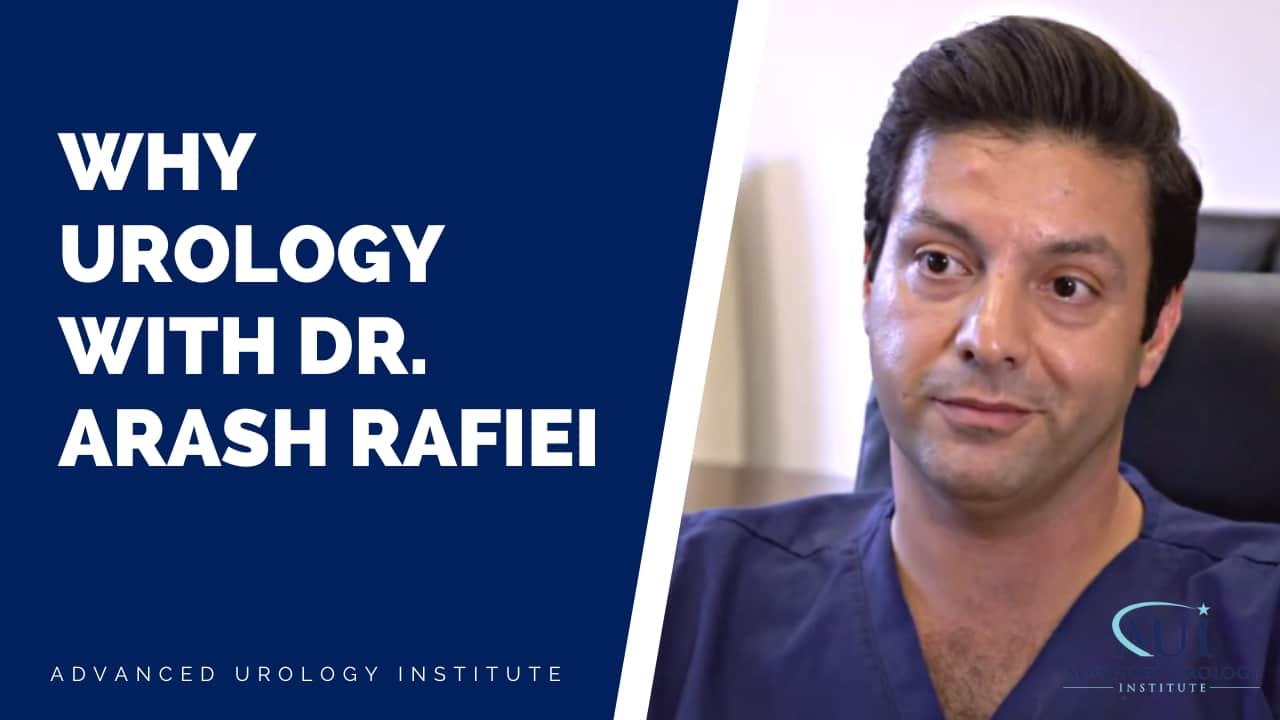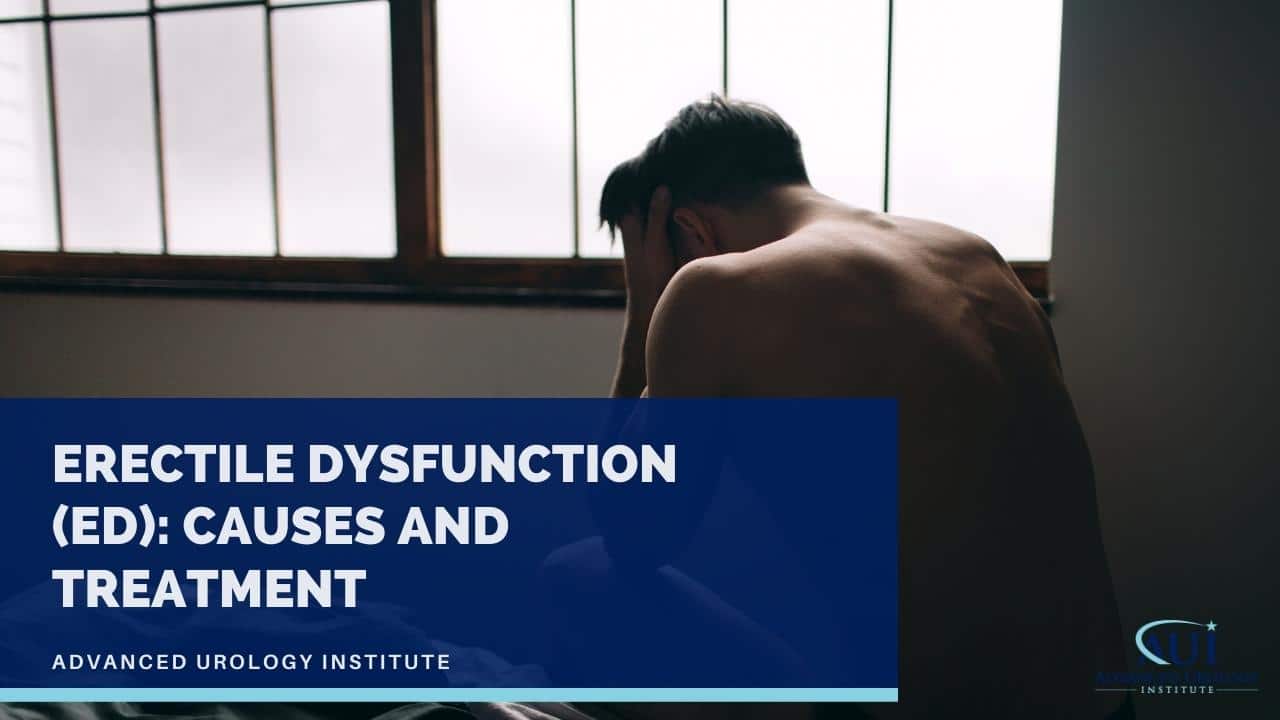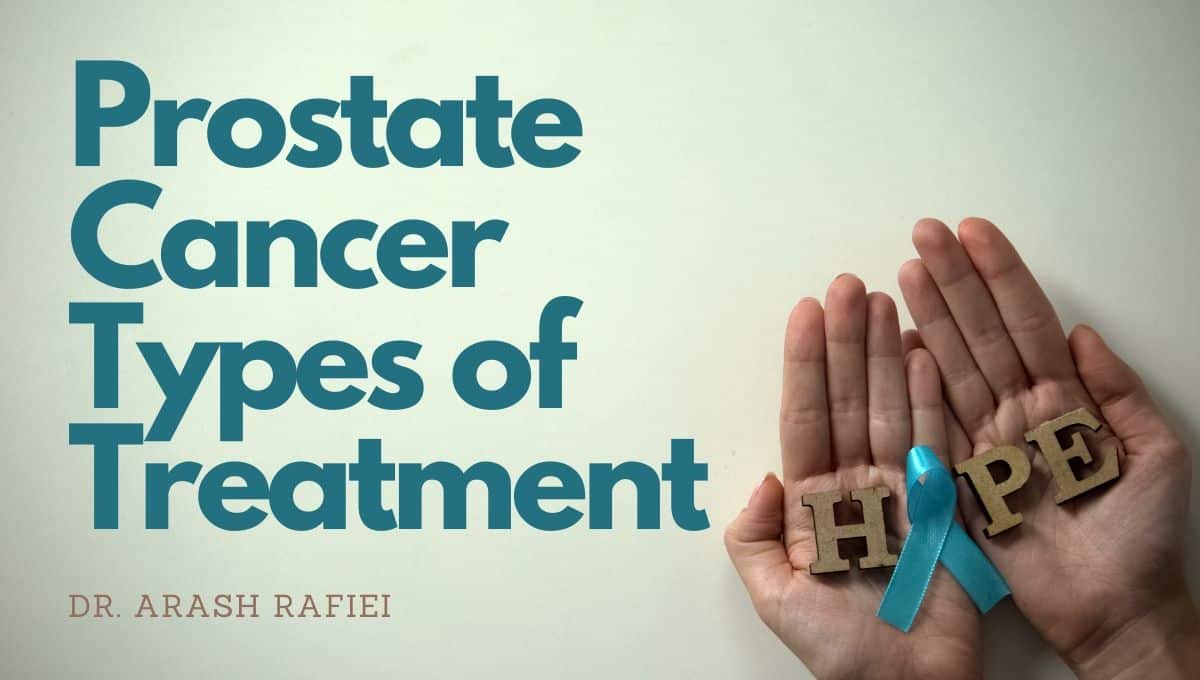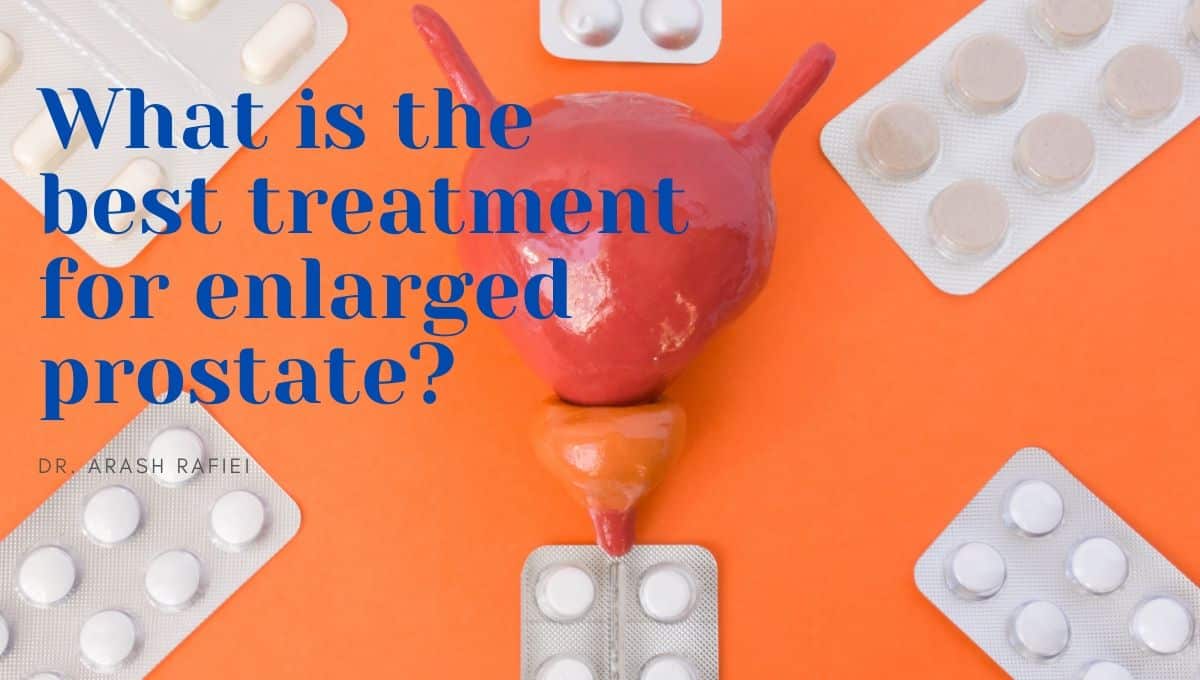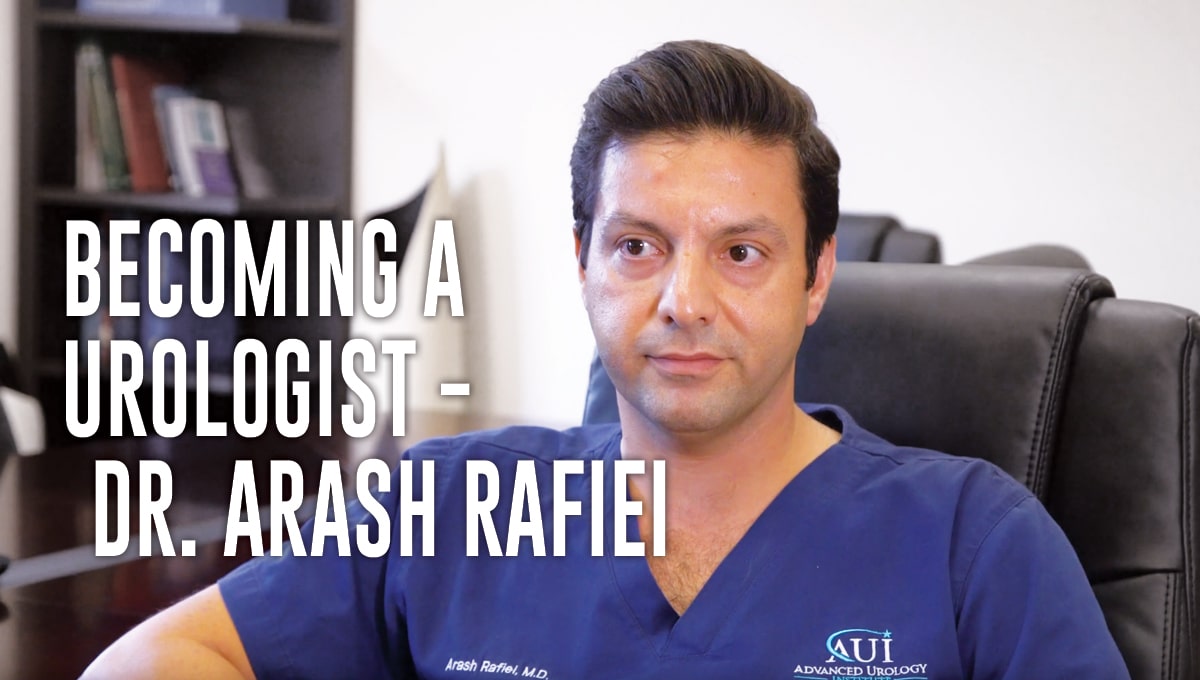Transforming Urological Care: Discover How Advanced Urology Institute Leads the Revolution! Innovations & Patient-Centered Excellence
Continue readingPenile prosthesis for the management of Peyronie’s disease – Dr. Arash Rafiei
Penile prosthesis are a valuable treatment option for men with ED and Peyronie’s disease who have not responded to other treatments. While the placement of a penile prosthesis can be more difficult in cases where there is curvature or scarring present, most patients will see positive results over time.
Continue readingWhy Urology with Dr. Arash Rafiei
Arash Rafiei, a board-certified urologist, discusses the diverse nature of his profession and the importance of staying current with technology advancements. He emphasizes that urology involves a mix of both surgery and medicine.
Continue readingErectile Dysfunction (ED): Causes and Treatment
Erectile dysfunction (ED) is increasingly becoming common. At Advanced Urology Institute, we are seeing more and more young men presenting with the problem.
Continue readingProstate Cancer Types of Treatment
Prostate cancer is one of the most prevalent types of cancer men face. According to board certified urologist Dr. Arash Rafiei, “One in nine men will have prostate cancer in their lifetime.” Although somewhat common, not all cancers in the walnut-shaped prostate gland are the same. Every case of prostate cancer is different and affects men differently. Urologists work with their patients to find the most effective treatment option based on each patient’s individual needs.
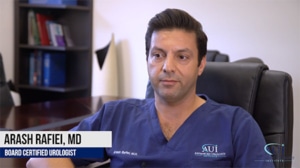 Urologists will consider their patient’s health, age, and the type cancer when deciding how to proceed. For some cases, the best treatment is none at all. When a patient has slow growing prostate cancer that is not spreading, a urologist may suggest holding off on treatment while monitoring the growth through routine appointments. The cancer needs to be taken seriously and watched closely, but invasive treatment is not always necessary for the patient’s health.
Urologists will consider their patient’s health, age, and the type cancer when deciding how to proceed. For some cases, the best treatment is none at all. When a patient has slow growing prostate cancer that is not spreading, a urologist may suggest holding off on treatment while monitoring the growth through routine appointments. The cancer needs to be taken seriously and watched closely, but invasive treatment is not always necessary for the patient’s health.
When treatment for the prostate cancer is needed, there are two main options: radiation and surgery. Both options offer the same level of prostate control and urologists will discuss the pros and cons of each with their patients. For surgical options the urologist may suggest a radical prostatectomy or robotic surgery. Both are well-tested invasive options that produce very good patient outcomes.
Radiation therapy is another common cancer treatment option. The radiation is centered on the prostate to kill cancer cells. The radiation will also kill some healthy cells as well, causing side effects. This is a non-invasive option that, like surgery, has its pros and con that a patient and doctor will want to discuss. Follow-up appointments to determine if the cancer responded to the treatment will also be necessary.
In addition to radiation and surgery, there are also some newer options that can be utilized in prostate cancer treatment. For instance, cryotherapy uses very cold temperatures to kill cancerous tissues and cells in the prostate by freezing them. There are also treatments using intense ultrasound waves centered on the prostate to destroy the cancer cells. These procedures are newer and there is less data on when they are the most effective, but they are options to consider.
All cancer is serious and can be a stressful and frightening prospect. Having a dedicated urologist who will listen and suggest the best treatment for each patient is key to success. Whether the best option is observation, radiation, surgery or a newer procedure, the Advance Urology Institute is a team of dedicated urologists with an array of treatment options for their patients.
What is the best treatment for enlarged prostate?
All men can experience difficulties caused by an enlarging prostate. As Board Certified Urologist Dr. Arash Rafiei says, “All men have prostates, and as we age our prostates enlarge, some more than others.” Yet each man’s situation and health is different. The symptoms of an enlarged prostate will differ greatly between individuals and the best treatment option for one may not be the best option for another.
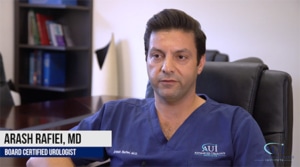 For most men, the symptoms of an enlarging prostate include the slowing of their urine stream, pushing to urinate, and having to go to the bathroom frequently. Many men also have the feeling of not fully emptying their bladder after urination. In many cases, men will find that they need to wake up multiple times in the night to go to the bathroom.
For most men, the symptoms of an enlarging prostate include the slowing of their urine stream, pushing to urinate, and having to go to the bathroom frequently. Many men also have the feeling of not fully emptying their bladder after urination. In many cases, men will find that they need to wake up multiple times in the night to go to the bathroom.
Because the symptoms of an enlarging prostate differ for everyone, the first thing a urologist will ask is if the symptoms are bothering the patient. For some men, the symptoms, especially in their early stages, are not a problem. Men may notice that they urinate a little more often. It may also take a bit longer for them to urinate when they do. They may have to get up once or twice at night when they did not have to before. A lot of men see these symptoms as inconveniences that they can adapt to and live easily with. In these cases, the urologist and their patient will just want to continue to watch the situation and may not need to take any action.
For men with more severe prostate enlargement the symptoms may be causing issues that are negatively affecting their lives. In these cases, their urologist may recommend medical therapy. Urologists will recommend medication that will help slow the growth of the prostate and relax the muscles around the bladder. This treatment will help make urination easier for men you have been experiencing difficulties. Slowing prostate growth will also give the patient more time before more invasive treatment options become necessary.
For cases where medication does not produce successful outcomes there are plenty of procedures that can help. One common procedure is a transurethral resection of the prostate. For this procedure a resectoscope in inserted through the tip of the penis and into the urethra. The urologist uses this device to trim away excess tissue on the prostate, relieving pressure on the urethra. This is an outpatient procedure and often helps relieve the patient’s urinary problems.
Another procedure that is new and becoming more common for treating enlarged prostates is Urolift. For this cutting-edge treatment, a urologist separates and lifts the prostate from the urethra using a suture, relieving pressure on the urethra and allowing better urine flow. A plus side to Urolift is that, unlike in a transurethral resection, no prostate tissue is removed allowing for quicker recovery. Most patients return home the same day as the procedure.
Having plenty of treatment options is the key to successfully managing prostate enlargement. The urologists at Advance Urology Institute get to know and understand their patients in order to find the best option for each individual. For more information, visit the Advanced Urology Institute website.
Becoming a Urologist – Dr. Arash Rafiei
Requirements To Become a Urologist
Like Dr. Arash Rafiei, all urologists are required to complete at least three years of college before they enter medical school. Most students complete four years of college with a Bachelor of Science in Chemistry or Biology. After graduation from medical school, the urologist-in-training will complete a residency at a hospital, usually one with a specialty in urology. The residency is a minimum of five years. Time during residency may be split in some programs as two years in general surgery residency and three years in urology. Board certification takes another two to five years. So, effectively, urologists can expect to spend 13 years in study or residency before board certification.
Selecting Your Urologist
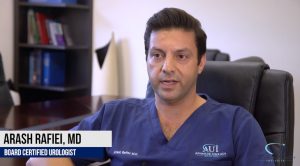 When choosing a urologist, you can specify that you would like a board certified doctor for your urology treatment. Make sure you write down all your questions for the doctor, and seek someone who will take into consideration your individual preferences. Ascertain that the facility and medical staff keep up to date on the latest technologies, such as minimally invasive techniques, as well as proven treatment guidelines.
When choosing a urologist, you can specify that you would like a board certified doctor for your urology treatment. Make sure you write down all your questions for the doctor, and seek someone who will take into consideration your individual preferences. Ascertain that the facility and medical staff keep up to date on the latest technologies, such as minimally invasive techniques, as well as proven treatment guidelines.
What does a Urologist do?
Urologists are medical doctors who specialize in the male and female genitourinary tract, including the urinary bladder, urethra, kidneys, adrenal glands and male reproductive organs. They often diagnose and treat male fertility, prostate cancer, and receive ongoing training in other medical and surgical problems related to these organs.
Advanced Urology Institute is a center for excellence in urology with board-certified specialists to treat all areas of this field. If you need an appointment with a urologist in Orange City, Florida, our team specializes in:
- prostate cancer treatment
- kidney stones
- problems with the bladder, including overactive bladder
- prostatitis
- erectile dysfunction (ED)
- urinary tract infections
- general urology
- and other urology conditions.
Dr. Arash Rafiei, MD is board certified and a member of the American Urological Association, the American College of Surgeons, and the Iranian American Medical Association. For more information, call the office of Dr. Rafiei at (386) 774-2121 or call one of our many Advanced Urology Institute locations. Our doctors will answer your questions and deliver the best service and care based on your needs.




